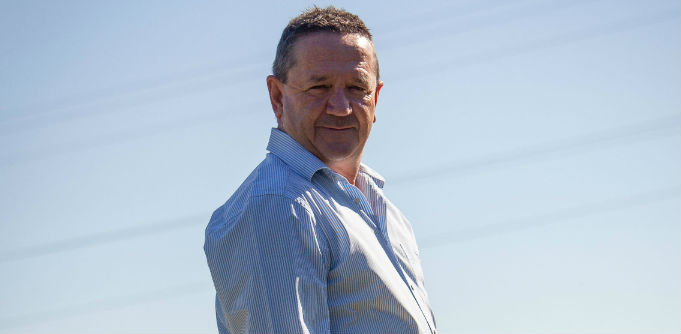
Business coach Chris Morrison. Source: Supplied.
Farms of the future will be very different. They may not be as romantic as the idyllic farms of the past with rolling green hills and a homestead under splendid gum trees in the countryside. We will see more inner-city farms, factory farms, vertical farms and smart farms. Farming organisations need to address the critical skills shortage and change their current image to attract a wider cross-section of people and skills to meet the demand.
Farming needs a new image. The Australian Council of Deans of Agriculture found that for each graduate of an agricultural-related degree there are six jobs available.
So why do we need to encourage young people into agriculture and farming? It’s simple: not enough people are taking up careers in agriculture. We need young people to understand the expanding opportunities in agriculture. Young people need to be guided into ag careers.
It’s essential to showcase how farming will embrace new technologies, artificial intelligence, machine learning and virtual reality to increase production and efficiency. While automation may reduce the need for some labour, there will be an increased demand for new skills. We need to focus less on farmhands and more on farm-brains.
Specifically, sensors and big data will transform agriculture and farming practices. Sensors will be everywhere and they will produce an enormous amount of information that will reduce variation in farming. Science and environments will be controlled to reduce the impact of weather on production. Future farming will rely on employees with a different skill set and personal values.
To win the hearts of younger people and attract them to careers in agriculture it will be imperative we ensure that the values of existing farmers are in sync with the younger generations’ values. We don’t need to agree with each other, we need to listen and understand each other’s views and opinions and how that can make a contribution.
Farming businesses need to embrace the core values of generation Z and millennials. Their values need to be considered, economically, ecologically, socially and culturally. We can potentially use farming to solve many human and social issues.
Future economic strategies that measure the wellbeing of people and communities before the traditional economic drivers of gross domestic product and wealth may be appropriate. This type of strategy will be embraced by young people who have an appetite for change, flexibility and positive workplace culture.
Millennials and generation Z’ers might be onto something. Just because what we have done in the agricultural industry for the past 200 years has got us to where we today, it might not get us to where we need to be in the next 200 years.
We need to embrace new thinking and new technology and combine it with what we are good at. Australia has a well-established “reputation for clean, green, safe, affordable, sustainable and ethical agricultural products”, so the sector must optimise production while maintaining its national and global reputation.
Agriculture and specifically farming is a visceral experience. In Australia, we need to identify how we can give more young people experience in agriculture. The challenge is to use farming as a vehicle to achieve multiple outcomes for a better future. Firstly, having a positive impact on the sustainable future of food and fibre production for the world. Secondly, enabling farming to improve the lives and wellbeing of a wider cross-section of the Australian population. That is to promote the lifestyle and career benefits of being associated with rural and regional Australia.
When the Kidman Pastoral Company was recently put up for sale, I contemplated ‘what if?’ What if the Australian government purchased this iconic, heritage-significant land holding and preserved it. Then they could have made it available to be used as the largest experiential agricultural classroom in the world. This would have facilitated the development of world-class farmers and agriculturalists. The vast landmass, controlled by the Kidman group, could have been developed with the support of industry to showcase how science and technology, incorporated into future farming systems, will feed and clothe the expanding world population. The Australian bush continues to hold a special place in the heart of Australians. An investment by our government into a cultural and historically significant landmass would have secured the agricultural heritage for future generations of Australians.
Education and skill development are the keys to the future of Australian agriculture and farming. The collective good of feeding and clothing the worlds expanding population gives our young people a compelling story and mission to follow. People in agriculture, the government and communities need to reduce barriers to entry for aspiring farmers and employees in agriculture.
This collective purpose will continue to feed their individual passions. When people are shown how to achieve flow by closely aligning their life and work goals, hard work isn’t hard. They become engaged and committed and build personal levels of discipline toward work. Our young people are our future and choice is their new superpower. Let’s collectively showcase their options.
NOW READ: Natural advantage: Australian startups are ready to lead the way in global agtech


COMMENTS
SmartCompany is committed to hosting lively discussions. Help us keep the conversation useful, interesting and welcoming. We aim to publish comments quickly in the interest of promoting robust conversation, but we’re a small team and we deploy filters to protect against legal risk. Occasionally your comment may be held up while it is being reviewed, but we’re working as fast as we can to keep the conversation rolling.
The SmartCompany comment section is members-only content. Please subscribe to leave a comment.
The SmartCompany comment section is members-only content. Please login to leave a comment.